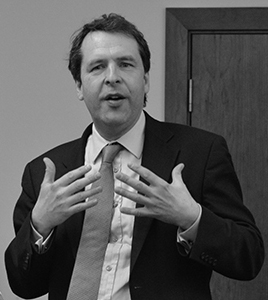
Case Study 1
A friend of mine recently asked me about a possible investment in a bond returning 9%. He wanted to know if it was too good to be true.
Almost certainly.
I asked what other alternative rates he had researched – by and large these seemed to be between 0.75% and 1.25% depending on terms – the normal sort of range one would expect from a bond-based investment return today. That should have been the first warning bell.
I asked him how he understood the concept of a bond. It was, he said, when you hand over a sum of money to a financial institution in return for a guaranteed return in a rate of interest.
I suggested that this particular scheme may have been more an investment which put capital at risk rather than a fixed-rate bond. He may indeed get his 9% but only at the expense of the capital he has invested; essentially the interest includes a repayment of capital. It could even be worse than that. The investment may be ‘asset backed’ by investment in property or other assets or even directly in a business. The ability to obtain the repayment of capital depends entirely on the performance of the assets or business.
So capital repayment was unlikely to be guaranteed. The second warning.
The next question was whether the scheme was guaranteed by the Financial Services Compensation Scheme. This is linked to the previous point – a bond which is not a bond but an investment against assets will not be covered by the FSCS. The third warning.
I asked whether he had ever heard of the company offering the so-called opportunity. The fourth warning. I wondered whether an inexperienced, young retail investor without risk capital to spare should ever invest outside of the major household names.
Case Study 2
In 2017 the British Steel Workers Pension Scheme closed to future accruals. This was partially at least as a consequence of the deal reached with the current owners of the Port Talbot steel works, Tata Steel, to protect around 8,000 jobs in South Wales. All parties accepted that Tata would be unable to continue to fund the existing scheme. This meant that existing workers had to decide what to do with their pensions. The choices were essentially, entering the Pension Protection Fund, a new Tata scheme (both these options involving reduced benefits) or transfer out to other arrangements.
The BBC reported one worker claiming that they had lost £200,000 by transferring out. The BBC also reported that some £1.1bn and some 2,600 transfers had been made. The Work and Pensions Select Committee, chaired by Frank Field MP, reported on the case. The Report noted that ‘dubious advisers exploited BSPS members for personal gain’ supported by ‘unregulated and parasitical introducers’ (para 50). The issues were the level of advice fees, high transfer fees and high on-going investment charges – not to mention the suitability of the advice to transfer out. The full Select Committee report can be read here.
Financial and business education is essential to a moral economy
These two quite different incidences made me think about basic financial and business education for all – i.e. beyond those taking Economics or Business Studies. None of my children report to me any input or teaching at school about budgeting, how pensions work, savings, managing debt, the tax system, basic information about business and the economy. They all were scathing about lessons in Citizenship. I am not competent to comment on the latter, but it seems to me we are missing a trick.
An enterprise economy which rewards innovation and creativity is essential for the well-being of all, for the common good. It is unrealistic to think that we can abandon models of economic growth and wealth creation as the key provider of jobs, goods and services, a tax base and indeed the profits for further investment. However, for that economy to function as a moral economy we need to ensure, yes, appropriate regulation and law, but more particularly that all participants in that economy can take part, not with equal outcome, but with equal opportunity. This requires partnership, skills, and indeed a degree of economic freedom and liberty. Hence, education lies at the heart of this vision, equipping future participants, whether entrepreneurs, workers, consumers or citizens. The first step to a moral economy is educated participants.
 Dr Richard Turnbull is the Director of the Centre for Enterprise, Markets & Ethics (CEME). For more information about Richard please click here.
Dr Richard Turnbull is the Director of the Centre for Enterprise, Markets & Ethics (CEME). For more information about Richard please click here.

The Tides of Life is impossible to categorise: it is not an autobiography, although the majority of it comprises autobiographical material; it is not a business leadership and management manual, although it contains a lot about leadership and management; and it is not a systematic work about Christian living, although it is full of guidance about just that.
Bill Pollard was for many years the CEO of ServiceMaster, the much studied and admired former Fortune 500 Company. Prior to that, he was, for a time, a practising lawyer in private practice and, for a brief period, an academic. Throughout his life he has been involved in educational projects and charities. He has seen much success, including the extraordinary growth of his company, but has also experienced the varying “tides of life”, including the early death of his father and, recently, the death of an evidently much loved grandson (who appears on the cover of this book). Now, in the evening of his life, he has written a book about what he calls the “lessons and choices in life”. Essentially, it is an overview of what he has learned through his many and varied experiences.
The result is a structured miscellany: there are reflections on what “our humanity is all about” and on God’s ordering of the world; thoughts about responsibility and stewardship; discussions of the nature of work of and purpose of business, the role of leaders and managers and how God may be served by those in business; and, last but not least, reflections on the importance and nurturing of relationships. In all cases, Bill Pollard teaches by means of stories from his own life, which are placed within the framework of a biblical world view.
Happily, in recent years there has been a considerable upsurge of interest in the calling of Christians to serve God throughout their everyday lives rather than through some detached “Christian service” element of them. Bill Pollard believes passionately in this calling and wishes to pass on what he has learned about how to put the theory into practice. He is clearly a man who has never stopped learning and, judging by the number of times he quotes what others have said to him over the years, a man who never forgets advice that he has been given. Above all, he is a man who believes in providence and who lives his life in the light of Proverbs 19:21 (“Many are the plans in a man’s heart but it is the Lord’s purpose that prevails”), which is quoted at the head of one of the chapters of his book.
Arguably, he tries to cram too much into the space available. For example, the seventeen pages devoted to good corporate governance include matters as diverse as the ideal size for a corporate board and comments regarding what went wrong in the banks in the run up to the global financial crisis. Some business people will find this section of the book superficial. However, this is a quibble rather than a serious criticism.
More significantly, even having read Bill Pollard’s fierce criticism of the results of the absence of morality in the market place, some Christians may question the merits of the market economy to which he is committed and may be disappointed that he largely asserts these benefits rather than arguing for them in an academic manner. He similarly asserts his Christian world view rather than seeking to defend it. This, however, merely reflects the nature of the book: it does not purport to be a work of free market or Christian apologetics. It is thus unlikely to persuade a reader to accept its basic premises. However, it demonstrates how these premises may be lived out in practice and may cause sceptics to ask themselves whether this might indeed be the way that we should live our lives. Furthermore, if like me you agree with the premises, you will find here a mine of practical Christian teaching and advice.
This is not a book to read quickly. It is worth reading in short sections over a prolonged period of time, reflecting on each part of it before moving on to the next part. It may be impossible to categorise but it is none the worse for that.
“The Tides of Life” by Bill Pollard was first published in 2014 by Crossway Publishing (ISBN 1433541742, 9781433541742).
Richard Godden is a Lawyer and has been a Partner with Linklaters for over 25 years during which time he has advised on a wide range of transactions and issues in various parts of the world.
Richard’s experience includes his time as Secretary at the UK Takeover Panel and a secondment to Linklaters’ Hong Kong office. He also served as Global Head of Client Sectors, responsible for Linklaters’ industry sector groups, and was a member of the Global Executive Committee.

It is often argued that taxation to promote the position of the poor is somehow a moral act on behalf of those that are better off and paying taxes to finance the transfers to those who are worse off. It is not.
It is not an intrinsically moral act for the same reason that, if I go out this evening with the intention of beating up my brother and I am stopped from doing so because he is with two muscly friends, I have not committed an act of moral restraint. If I am put in prison for not paying taxes, I have not committed a moral act as a result of paying those taxes. There is no moral equivalence between paying taxes because you have to and the self-sacrifice that comes with philanthropy. Indeed, taxation can exhaust our ability to make moral choices to help our families, our neighbours and society more widely.
The moral problems that people often feel exist with a free and prosperous economy such as selfishness and an individualistic mindset are no less inherently present in an economy with high taxes. Self-interest can be every bit as present in the political system as it is amongst individuals. The idea that we have two natures – a selfish one in the private sphere but a better, more refined, less self-interested nature that is present in the public sphere has no justification in moral philosophy or empirical evidence. After all, when did you ever see a demonstration in a town calling for the local hospital to be closed down so that the neighbouring town could have more resources? Indeed, the zero-sum-game nature of public sector activity promotes selfishness and conflict – witness the lengths people go to in order to obtain places in good state schools, including fraud. In the private sphere, co-operation and providing something of value to customers tend to be rewarded.
The moral limits of taxation
So, there is no credible moral case for a high tax economy. But we can go further. Ultimately, taxation is an issue of how we view property rights. As Pope Leo XIII noted, property (the money that we have) is just wages in another form. To take another person’s property through taxation is to deprive a person of his justly earned wages.
Of course, the state does need resources and it is legitimate to tax people’s earnings in relation to their ability to pay in order to provide those things that are needed for the protection of society as a whole (defence, police etc.). It is also legitimate to tax people to ensure that all in society can have the resources to live in dignity if they are not provided by charity (through the provision of housing, food, healthcare etc.) – though these things do not need to be provided directly by the state.
This might justify taxation of between 5 and 20 per cent of national income – nothing like the 46 per cent of national income that the state spends in the UK today.
Practical aspects
In many practical ways, our tax system is morally problematic. It discriminates against family formation – with results that we see very clearly and, of course, it discourages work. A tax system that undermines family and work cannot be thought of as moral.
And, of course, when the state is spending nearly half of national income, there can be no general agreement about the morality of the things on which it spends money. In spending over 46 per cent of national income, the state finances all sorts of other things with my money that I think are morally wrong – and probably different things that you think are morally wrong.
A tax system in a nation of 65 million people, mediated by a huge bureaucracy controlled by a government called to account in elections every five years, cannot possibly replicate the true personal human compassion and philanthropy that is necessary if we are to provide the poor with genuine help. The individual, in this context, becomes a small cog in a giant wheel whose right of initiative has, in large part, been taken away and who has been encouraged to delegate his genuine societal responsibilities to those in need to the state. As Pope Benedict has said: solidarity is the responsibility of everyone to everyone and it cannot be delegated to the state.
This does not mean that the state should not provide for the poor. However, a low tax economy is conducive to social co-operation, individual initiative, the flourishing of families and high levels of employment. Furthermore, it is also conducive to the genuine voluntary assistance that the better off must give to those who need it. Society is not more moral when we discharge our responsibilities to those in need by voting for a party that will form a government that will manage a bureaucracy that takes money from one group of people to give to another group of people with neither group ever meeting each other.

Philip Booth is Senior Academic Fellow at the Institute of Economic Affairs and Professor of Finance, Public Policy and Ethics at St. Mary’s University, Twickenham. He also holds the position of (interim) Director of Catholic Mission at St. Mary’s having previously been Director of Research and Public Engagement. From 2002-2016, Philip was Academic and Research Director (previously, Editorial and Programme Director) at the IEA. From 2002-2015 he was Professor of Insurance and Risk Management at Cass Business School. He is a Senior Research Fellow in the Centre for Federal Studies at the University of Kent and Adjunct Professor in the School of Law, University of Notre Dame, Australia. He is also an Associate Fellow with the Centre for Enterprise, Markets and Ethics (CEME).

This is a transcript of a speech given as part of a debate on the EU Referendum. The event was organised by James Cowper Kreston and held at the Oxford Union.
The EU Referendum – some moral and economic perspectives
Thank you for the invitation to speak this evening, and thank you also for putting on this event.
How, then, will we decide between the competing visions for Europe, for the future of the United Kingdom and our relationship, not only with Europe, but with the world? Will we decide on the arguments about economics, borders or sovereignty? Will we make our decision on the basis of statistics? And if so, which particular statistics will we rely upon? Or maybe we will decide on the basis of propaganda – but who’s propaganda would we trust; the government’s, the Brexit campaign or some other vested interest?
My initial observation is that larger businesses, especially those with a significant export market to Europe, tend to be more swayed by the economic arguments for remaining (that is, primarily the argument of access to markets) than smaller businesses that tend to be more exercised by the impact of regulation (that is, the control of markets)
So, this evening, I want to open up a different kind of question, to try and bring a moral economic perspective into the debate, or perhaps two questions, one about the nature of markets, access to markets, trade and employment and another about regulation, control, business development, entrepreneurship, innovation and creativity.
The most depressing argument in this debate is….the EU costs us £55m per day (gross amount, no account of rebate or EU payments to the UK) or £35m a day (net of the rebate and closer to the amount actually paid over) or £23m a day (net of EU payments for farming and poorer areas support – but not counting the payments to universities for research). Cash and economic costs and benefits are not the same thing. We must go deeper in our analysis. And we should ask questions about purpose, the long-term economic costs and benefits, not just cash payments.
The most significant economic argument is concerned with access to markets. The reason it is the most important question is that economic growth is a necessary condition for individual, family, community and national welfare. This is a moral question. Without economic growth we damage employment prospects, reduce the tax base and stifle innovation. Economic growth is not a zero-sum game and is also a prerequisite for the political debates around wealth and income creation and distribution. In other words, unless we bake the cake in the first place, we cannot debate how the cake should be divided.
So, we should ask how best, then, to bake the cake. Access to markets means trade and exchange, import and export, competition and so on. The freedom to trade has shaped and transformed the world we live in. So, we know the EU represents the largest single market in the world (with the US being second). The UK is the largest market for exports from the EU (though only at around 16% of total EU exports), but for the UK around 44% of our total exports go to the single European market, though that percentage has been falling.
Does this mean that the UK couldn’t negotiate its own free-trade agreements with other countries, or that either new or even traditional markets could not be opened up or expanded? No, it does not mean that, but it does mean that we need to take very seriously indeed, the opportunity for access to the world’s largest single market and surrender that only after very careful thought. To lose that access is not irreplaceable, but would certainly damage short and medium term growth prospects, and there would be a cost to the negotiation of multiple trade agreements which may, or, more likely, may not, obtain equally favourable trade terms.
And we certainly need to be wary of naivety; the oft-quoted Norway model is illusory; Norway pays 90% of the UK per capita payments, they have to observe the single market regulations, and, indeed, it is worth quoting The Economist reporting a Norwegian minister as follows, ‘if you want to run Europe, you must be in Europe. If you want to be run by Europe, feel free to join Norway’ (Economist, 4th March, 2016, p20).
So, let me turn to the second question, that of regulation. The impact of the EU on the regulation of the market is undeniable. Part of the problem stems from the fact that what we read about in the newspapers is the silly stuff – the size of a vegetable, bendiness of bananas and cucumbers, regulations on washing-up gloves and so on. In reality the regulative impact of the EU extends far and wide into employment, market regulation, discrimination, health and safety, and into industry sectors from investment management to transport and shipping.
How are we to assess the nature and impact of this regulatory regime? Let’s start with the negative impact. There is little doubt that there is a ‘regulatory bureaucracy’ about the EU which rather reinforces the observation of Andrew Bailey, formerly the deputy-governor of the Bank of England, that ‘the main consequence of an increase in regulation is an increase in the number of regulators.’ Similarly, I think there is a cogent argument that EU regulation is an easier burden to bear for larger firms than smaller and medium-sized enterprises; and, in my view, it is SMEs who are the powerhouses of innovation, entrepreneurship and growth, indeed, collectively also of employment. Perhaps the Working Time Directive is an example of that. The directive, with the laudable aim of protection, is, however, an example of the different cultural mind-set between the UK and a Europe that sees the control of working hours as a governmental responsibility. You can see how, with a regulation like the Working Time Directive, a larger organisation with the resources of an HR department, would find those rules easier to manage and implement than an SME. Some of the industry-specific regulation is of a similar outlook – so, a significant number of effective, focussed, co-owned and co-invested small investment management firms find the burden of the regulatory regime focussed and geared towards the larger investment management firms, with their resources and capacity – all investment management firms with funds under management of more than £100m are treated the same, subject to the same requirements, reporting and regulations. So, I am persuaded that there is a negative impact of EU regulation.
However, there is a ‘but.’ First, I believe, morally, that the freest access possible to markets should be encouraged, but as we know, the free market is never quite as free as we think or might like. So, the single market itself is surrounded by a tariff wall; free Europe or fortress Europe? And in addition to tariff walls around the single market, because a free market is never entirely free, and indeed is populated by participants and players who do not possess perfect information, and, I might add, are not perfect and flawless characters, a degree of regulation is necessary. Second, therefore, the idea that leaving the EU means we can simply sweep away all of this regulatory regime is neither right nor appropriate. Even if we left the EU, and abandoned the more bizarre or restrictive regulations, the reality is that any independent UK government is going to impose the overwhelming majority of the current regulatory regime. So, although, I too would like changes, I too find the bureaucracy and extent of EU regulation irksome, it is naïve in the extreme, to think that leaving the EU would enable all of this regulation to be simply abandoned.
So, where have we got to? We have, I think, established the importance for economic well-being of the single market; with the challenge that we might lose other opportunities, but with much uncertainty. We have also argued that there is a negative impact of a regulatory regime bearing heavily on SMEs; yet with the reality that it would not all be swept away by leaving.
How to decide? I remain sceptical of the campaigns and the propaganda from both directions! Rather, ask this question, what will best enable the maximum flourishing of the economy which in turn will enable the flourishing of individuals, families, communities and the nation? Is access to the single market and its benefits too significant to surrender? Is the regulatory regime of the EU sufficiently oppressive and burdensome that it prevents SMEs from flourishing? Of course, there are other considerations, non-economic arguments about borders and sovereignty, but as business people, we need to assess fairly the moral imperative of ensuring a successful business environment for the country. The answer to that question might vary from person to person, but let us at least ask the right questions.
Photo Gallery:
Dr Richard Turnbull is the Director of the Centre for Enterprise, Markets & Ethics (CEME). For more information about Richard please click here.